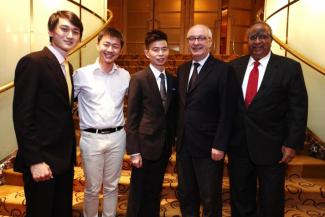
Taking up that challenge and looking into their own ‘crystal balls’ with much enthusiasm were students from SMU who participated in The Economist Predictions Competition for The World in 2014. Numerous entries had poured in with all sorts of wonderful prophecies. These were then shortlisted by The Economist editors to reveal ten great entries and the selection of the top three made by SMU President Professor Arnoud De Meyer. It was both tense and exciting for the finalists when the overall winner was picked and announced by The Economist Executive Editor and host, Mr Daniel Franklin at the start of The World In 2014 Gala Dinner held on 26 November at The Fullerton Hotel.
Looking somewhat surprised at first upon hearing his name being announced as the overall winner then breaking into a smile was Mr Gabriel Tay Rui Lin, a third-year student from SMU School of Economics with a second major in Finance.
His prediction which stood out as being insightful: “2014 will see the destruction of tax havens and abolition of bank secrecy laws. Following the narrow escape from the fiscal cliff and recent government shutdown in the US coupled with financial turmoil in the EU, in 2014 tax havens will face increasing pressure from both the EU and the United States to comply with foreign account tax compliance acts. While tax avoidance is still legal, this might be contested more often in 2014 – all in the hope of recovering lost government tax revenues from tax havens such as Geneva and Singapore.”
The other two finalists, Spencer Yang Zijian, from SMU’s Lee Kong Chian School of Business (Year 4) and Oon Tian Sern from School of Social Sciences (Year 1) were proud runners-up. Their predictions on what will change the world in 2014 were most enlightening.
Sharing his glimpse into the future, Spencer said that, “2014 will be the year that wearable technology goes mainstream. We have seen the much-hyped introduction of Google Glass, Samsung Galaxy Gear and various Minority Report-inspired products. Many companies will jump on the bandwagon. I expect to see continuous innovation and companies daring to push the next frontier as they attempt to introduce the next product that the world will employ as an indispensable tool. To many, this could indeed be a childhood dream come true. To others, like app developers and marketers, it will represent a great ecosystem to be part of.”
These words will, no doubt, resonate well with the entrepreneurs as well as with consumers who are looking forward to innovative forms of fashion that not only look sharp but also give the user some enhanced power or ability to experience connectivity within the user’s everyday life and movements.
The other finalist, Tian Sern gave his prescient view on how he sees the world in 2014: “The vision of smart cities’ optimal resource management will gain much traction in 2014. Low-cost sensor technology coupled with increasing use of wireless home automation products will result in greater home-energy savings. Leading innovators of the internet of things, such as Spain, Germany and Japan will produce findings on early forest-fire detection, sensors for environmental monitoring and intelligent vehicle communication systems, contributing to minimising city resource waste. Augmented by the IT infrastructures of big data analytics, nations will learn to manage energy resources efficiently.”
Congratulating the overall winner and finalists, Professor Arnoud De Meyer remarked, “Provost Raj and I are very proud that our students have come up with some really provocative predictions on what it might be like for the world in 2104. The ability to dream, to imagine is how the creativity spark is ignited. At SMU, we not only encourage our students to do that but we also provide them with numerous opportunities both in and out of the classroom, local and overseas to discover for themselves the many wonders of our world – how it is and how it can be.”
Expressing his views on how the world can be at The World in 2014 Gala Dinner was Mr Daniel Franklin who set out his bold predictions on the sporting shows, and political and economic shifts for the year ahead. The Gala Dinner was also an evening of stimulating discussions with several luminaries who shared their interesting, candid, and at times, entertaining predictions. The audience engaged with politician Tsakhiagiin Elbegdorj, President of Mongolia; philanthropist Andrew Forrest, Chairman of Fortescue Metals Group and the Minderoo Foundation, environmentalist Philippe Cousteau Jr, President of EarthEcho International; and award-winning cartoonist Kevin Kallaugher of The Economist who also wanted to prove that anyone could do an illustration for 2014 so he took the whole dinner party through a step-by-step drawing lesson. Everyone was amazed at their rather good drawings on which they happily put their names.
[Featured photo: (Photo courtesy of The Economist) SMU President Professor Arnoud De Meyer and SMU Deputy President and Provost Professor Rajendra K. Srivastava (2nd and 1st from right) congratulating predictions competition winner Gabriel Tay (centre) and finalists – Spencer Yang and Oon Tian Sern (1st and 2nd from left)]